Watch A.J.'s live training on redesigning resumes for a post-Covid world, then keep reading for more tips:
In this webinar and accompanying post below, business writing expert A.J. Ogilvie explains how you can respond to changing industry trends, with examples of what those responses might look like in a resume.
The Post-Covid Resume Guide: How to Work with New Trends
Coronavirus has changed our lives in ways that are both permanent and temporary.
And within the flux of all this change—switching from working in-person to remote, seeing some industries grow and others disappear—it’s hard to find the time or energy to re-think our careers, our resumes, what we want to do, and who we want to become.
But we should try. And some, like historian Yuval Noah Harari, argue that we must:
“in order to keep up with the world of 2050, you will need not merely to invent new ideas and products—you will above all need to reinvent yourself again and again.”
How though? Hermana Ibarra, Professor of Organizational Behavior at London Business School and author of Working Identity: Unconventional Strategies for Reinventing Your Career, argues that the most strategic way of confronting uncertainty is to drop our old assumptions and radically rethink our approach.
In other words, unique times require unique approaches that depart from conventional, or pre-Coronavirus, ways of thinking about work and careers. And one relatively obvious place we should start to think in new ways is with our resumes.
And yet in order to figure out how we all might think differently about our careers, it’s helpful to first consider some of the major trends that are shaping how we work today and what those trends might mean for how we think about pursuing new jobs.
How Has the Workplace Changed?
The workplace has shifted in three key ways:

You need to be able to demonstrate that you’ve evolved with the world of work, but before you can start selling your skills, you need to understand these emerging trends in resume skills in a little more depth.
Let’s take a look at each one and what it means for employees.
Hybrid Virtual
Before the pandemic, the process of looking for a job or pursuing a career was more constrained than it is today. The most significant constraint was location—most of us looked for jobs in places in specific geographic locations. To be sure, before the pandemic more and more companies were transitioning to a hybrid remote or fully remote model. But it was a relatively small percentage of all organizations globally.
That has changed significantly. The reality of work in a Coronavirus and post-Coronavirus era is that the new norm is likely to be a hybrid virtual model. In this model, some employees are working in the office, some are working remotely, and some are doing both.
Spotify and Twitter are perhaps two of the better known companies who have fully adopted the work-from-anywhere model in addition to Basecamp, Github, and Workpress. Salesforce, Microsoft, and Facebook are offering flexible versions of work-from-anywhere.
And so while most companies have yet to figure out exactly what their model will be as the pandemic slowly appears to be heading to an end, it’s clear that this new work model is here to stay in some format. What companies will be looking for in resumes is evidence of effective, impactful approaches to managing and completing projects in a hybrid work model. Below, I explain what this evidence might look like.
Fluidity
If the last century of work has primarily been defined by standardization, routinization, and hierarchies, the next century will be about disaggregation, uncertainty, and fluidity.
To respond to this transformation, workers will have to become flexible learners, open to taking on new roles, and unafraid of moving across teams, organizations and industries; in short, being a polymath—someone adept and curious in multiple areas—will be key to navigating the post-Coronavirus world successfully.
This pro-polymath view is reflected in recent works by David Epstein’s 2019 book Range: Why Generalists Triumph in a Specialized World, and Arthur Brook’s March 2021 Atlantic piece “Here’s 10,000 Hours. Don’t Spend It All in One Place.”
Similarly, Waqas Ahmed argues in his June 2020 article in Fast Company that “cognitive flexibility” is the “indispensable skill that will future-proof your career.” The central thread that runs through these works is that we should actively resist being siloed, both in how we think but also in how and where we work.
The goal, as Ahmed notes in his piece, is to foster in ourselves a mode of creativity, imagination, and openness that generates innovation and fearless problem-solving.
Cognitive Output
Traditionally, companies keep track of employees by keeping records of the number of hours an employee works. But in a Coronavirus world, given the lack of face-to-face time, no one really knows when people are working. What this means is that you can’t just pull off a job by dressing nicely and looking busy at your computer each day.
This trend is articulated in more detail by Jared Lindzon in his 2020 Fast Company article, “It’s time to stop measuring productivity in hours.” Lindzon reveals how the complexities of remote work are colliding with companies’ old ways of doing things, a philosophy he describes as “defined by standardization, where the vast majority of jobs valued physical presence over cognitive output.”
In the distributed-work reality of 2021, cognitive output has become the primary way for most companies to evaluate productivity.
For workers, this increased focus on output means that we’ll need to double down on our processes and systems to ensure that 1) we’re getting things done but 2) we’re getting the right things done.
As Robert Pozen, a senior lecturer at MIT Sloan School of Management argues in Lindzon’s article:
“People should spend real time figuring out what their goals, priorities, and objectives are, and agree on success metrics on how you can tell after a week or a month whether you have achieved those.”
Additionally, a focus on cognitive output means that it’s even more important for your resume to demonstrate, with specific examples, your ability to work remotely and produce tangible results that have made an impact.

While there are countless ways that the pandemic has changed us, these three trends—the hybrid virtual model, the polymath future, and an emphasis on output over time—are perhaps the most significant and the ones that we should most directly address in our resumes. Below, I articulate what that might look like.
What Does All This Change Mean for Your Resume?
1. Express Your Unique, Generalist Self in Your Summary
It’s always been a good idea to have an engaging, eye-catching summary at the top of your resume. This summary organizes all of the disparate elements of your resume into one cohesive and compelling story of who you are—and it enables an employer to make an easier and more informed decision about whether you might be a great fit for them.
Given the contemporary importance of being a generalist and having “cognitive flexibility,” the summary should still be compelling but also demonstrate some degree of versatility and interdisciplinary thinking.
Aspiring product manager obsessed with solving multi-disciplinary problems that have no simple solutions. Problem-solving is both an art and a science, and I’ve developed my own philosophy as a result of diagnosing, addressing, and solving a range of problems across product teams at several SaaS start-ups as well as non-profits. My philosophy of radical collaboration, thoughtful leadership, and obsession with one goal has led to average product revenue increases of over 40%.
2. Be a Game-Changer with Data-Driven Before and After Stories
One thing most of us do pretty well in our resumes is talk about our successes. But we can’t just talk about them—we need to sell them. One way to do this is to emphasize the “What is—What could be” element of our anecdotes. We want to make visible the before and after effects of our impact and we want to use data to do that.
In a post-Coronavirus world these before and after stories help demonstrate that you’re generating output and are able to get things done. Here are a few examples:
Designed and implemented knowledge management system for new product team that saved $110,000 on overall project through a 20% decrease in team member allocation time.
Oversaw root-cause analysis of project management inefficiencies that increased client satisfaction 36% and increased overall portfolio revenue by 17%.
Learn more about using storytelling to communicate your achievements and move employers to action in this training session:
3. Be a Remote Work Communications Expert
Regardless of whether you want to work from anywhere, hybrid, or fully in-person, it’s clear that you’ll have to work with people who are operating in all of these formats simultaneously.
Few, if any, companies have figured how to handle this complex combination of workers, especially in regards to meetings and projects; how do you encourage full participation in a meeting when three members are participating virtually across three different time zones and two members are sitting together in an office?
All of this uncertainty is an opportunity for you in your resume to demonstrate that you can help organizations solve these remote work challenges. In addition to your before-and-after success stories you can have bullets that explain how you effectively handled these projects during Coronavirus.
Developed and implemented team collaboration system among 30 associates across four time zones that increased team member satisfaction by 22% through a codified remote work manual.
Organized over 75 town-hall meetings that increased organizational participation by 35% in six months.
Moving Forward
If there’s anything that Coronavirus has taught us, it’s that any assumptions of what the future will look like are better couched as hypotheses as opposed to statements of fact.
The three work trends outlined here—the hybrid virtual work model, an emphasis on employee output vs hours worked, and the importance of being a generalist—have emerged within the pandemic but also began to take root even before Coronavirus.
If business is in some sense all about placing good bets on the future, the same of true is of our resumes.
It’s likely a good bet that these Coronavirus work trends are here to stay, and our resumes should evolve to address these trends.

